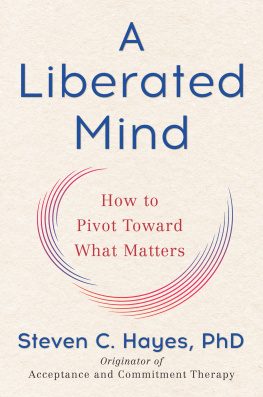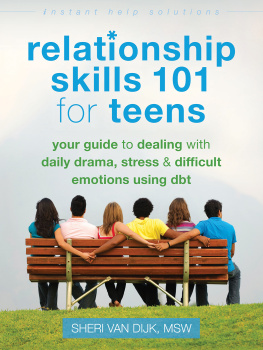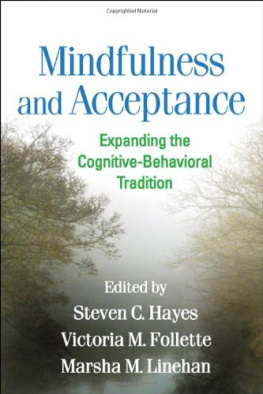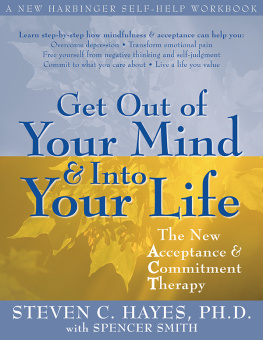Joseph V. Ciarrochi, PhD, is professor of psychology at the University of Western Sydney and an active researcher with numerous national competitive grants. His research focuses on understanding and developing social and emotional well-being. Ciarrochi has written over eighty international journal articles, books, and book chapters, and is regularly invited to speak at conferences and leading universities and institutions around the world. He has authored and edited eight books related to the promotion of mental health and well-being.
Louise Hayes, PhD, is a clinical psychologist and academic with the University of Melbourne in Australia. She has devoted her career to helping young people and their families. She is a leader in adapting acceptance and commitment therapy (ACT) for adolescents, researches the outcomes of ACT for young people, and conducts ACT training for professionals internationally.
Ann Bailey, MA, is an experienced clinical practitioner who helps people manage their emotions and live more vital lives.
Foreword writer Steven C. Hayes, PhD, is Foundation Professor of Psychology at the University of Nevada, Reno. He is the author of innumerable books and scientific articles, including the successful ACT workbook Get Out of Your Mind and Into Your Life.

This book is a fantastic resource, full of wisdom, compassion, and extremely practical tools for helping teenagers thrive in the face of lifes challenges. It is not only essential reading for teenagers, but also for parents, teachers, and any therapists or counselors who work with this age group.
Russ Harris, author of The Happiness Trap and The Reality Slap
In Get Out of Your Mind and Into Your Life for Teens, Joseph V. Ciarrochi, Louise Hayes, and Ann Bailey provide teenagers with access to the powerful principles of acceptance and commitment therapy. The lessons are broadly applicable to any number of struggles a teen might have. Teens cant help but recognize their own struggles in the stories told and dare to pursue their own hopes in the exercises offered. Perhaps most importantly, in the midst of a stage when many peoples thoughts and feelings isolate them from the lives they care about, these authors communicate clearly that the readers are not alone and dont have to struggle. I believe this book will be an invaluable resource for any therapist, parent, family member, or friend who wants to help a teen they care about.
Emily K. Sandoz, PhD, assistant professor of psychology at the University of Louisiana at Lafayette
Its hard being a human, and its not easier being a teenager. Ciarrochi, Hayes, and Bailey clearly know what theyre talking about from their own experiences and from working with youths who struggle. This is a book that should have been written long ago. I wish someone had given it to me when I was a teenager.
Rikard K. Wicksell, PhD, licensed clinical psychologist and a clinical researcher at Karolinska University Hospital and the Karolinska Institutet in Stockholm, Sweden
An extraordinary resource for teens and adolescents who are struggling with everything from the trials of being a teenager to more serious problems. The authors provide an engaging, compassionate, and understandable road map with practical suggestions and exercises that any teen will want to explore. It is an amazing gift to have such a useful book to recommend to teens and their families.
Jennifer Gregg, PhD, associate professor at San Jose State University and coauthor of The Diabetes Lifestyle Book
Get Out Of Your Mind and Into Your Life for Teens is an extraordinary guide for teenagers pursuing extraordinary lives. Ciarrochi, Hayes, and Bailey offer practical exercises and introduce us to characters who use bold warrior skills to pursue more intentional and meaningful lives. In so doing, they lessen the stigma most teens feel when they struggle with common problems, such as rumors, loneliness, and harsh criticism from others. My hope for this book is that it will become a textbook for high school and college students all over the world.
Patricia J. Robinson, PhD, coauthor of The Mindfulness and Acceptance Workbook for Depression and Real Behavior Change in Primary Care

Publishers Note
This publication is designed to provide accurate and authoritative information in regard to the subject matter covered. It is sold with the understanding that the publisher is not engaged in rendering psychological, financial, legal, or other professional services. If expert assistance or counseling is needed, the services of a competent professional should be sought.
Distributed in Canada by Raincoast Books
Copyright 2012 by Joseph V. Ciarrochi, Louise L. Hayes, and Ann Bailey Instant Help Books New Harbinger Publications, Inc. 5674 Shattuck Avenue Oakland, CA 94609 www.newharbinger.com
Cover design by Amy Shoup Interior illustrations by Sara Christian Game of Life illustrated by Tegan Spink Edited by Jasmine Star Acquired by Catharine Meyers
All Rights Reserved
Library of Congress Cataloging-in-Publication Data
Ciarrochi, Joseph.
Get out of your mind and into your life for teens : a guide to living an extraordinary life / Joseph V. Ciarrochi, Louise Hayes and Ann Bailey ; foreword by Steven C. Hayes.
p. cm.
Summary: "Based on the bestselling book Get Out of Your Mind and Into Your Life by acceptance and commitment therapy (ACT) founder Steven Hayes, Get Out of Your Mind and Into Your Life for Teens helps readers identify and act on their values, even when faced with difficult emotions and life events"-- Provided by publisher.
Includes bibliographical references.
ISBN 978-1-60882-193-8 (pbk.) -- ISBN 978-1-60882-194-5 (pdf e-book) -- ISBN 978-1-60882-195-2 (epub)
1. Acceptance and commitment therapy. 2. Values clarification. I.
Hayes, Louise. II. Bailey, Ann, MA. III. Title.
RC489.C62C53 2012 616.89'1425--dc23
2012011454
To Grace and Vincent
May you always find the warrior inside youAB and JC
To Jackson and Darcy
After all, youth is the moment. Live boldlyLH
foreword
Whenever you learn to do something complex, like drive a car, no one expects you to just start doing it, learning everything by trial and error. Thats why theres drivers ed. If you had to learn to drive just by trial and error, you might try to drive right into a tight parallel parking spot, rather than backing in at an angle. Without some guidance, you might misjudge the distance between your car and another car as you merge into traffic, perhaps with disastrous consequences.
Consider this book a drivers education course for living.
Classroom instruction on how to drive cant do everythingreal skill in anything comes only with experience. A person learning to drive might at first use a mental checklist to remember to look to the left and right at a stop sign, or to look in the rearview and side mirrors before passing. Eventually, all of that will be done smoothly and instinctively. A drivers ed class cant do the practicing part for you, but it can help you begin the learning process on the right foot.
This book is about the most complex thing you possessyour own mind. We get a little drivers education about our own minds from what others tell us, but it turns out that a lot of conventional advice is pretty far off from what really works. There is a science of psychology, and careful research has regularly arrived at conclusions that go almost in the opposite direction of what the culture, our friends, or the media tell us to do. Thats a problem. If behavioral science is right, it means we tend to practice the wrong moves, and practice them so frequently that they become instinctive.

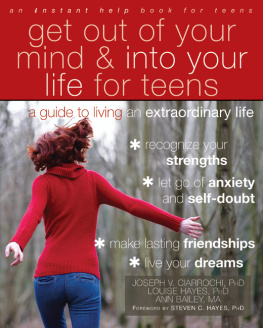
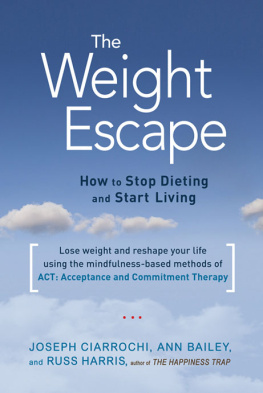
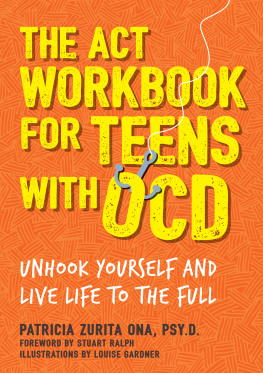
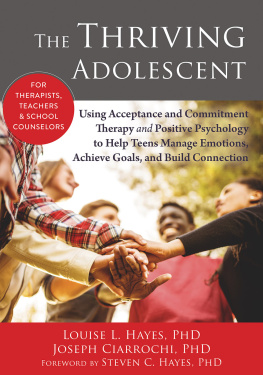
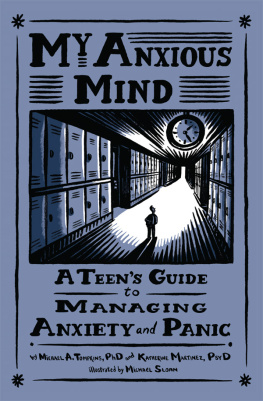
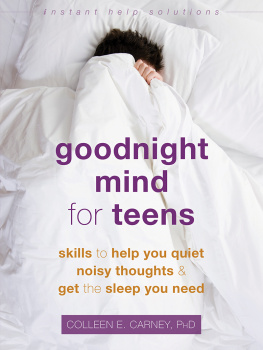
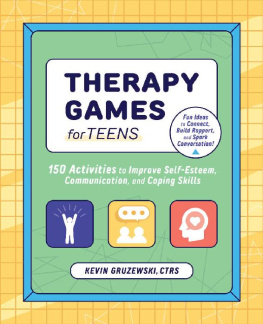
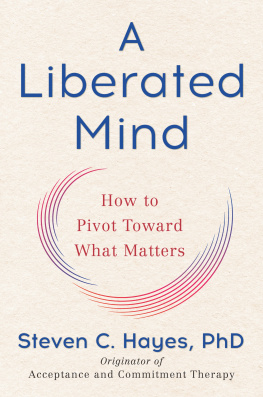
![Boehmer Paul - Get out of your mind & into your life: [the new acceptance & commitment therapy]](/uploads/posts/book/194502/thumbs/boehmer-paul-get-out-of-your-mind-into-your.jpg)

